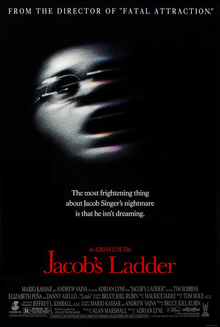“Jacob’s
Ladder” is a cult classic that falls in the war horror movie subgenre. It was written by Brian Rubin in 1980, but it
took him ten years to convince a studio to make it. Ironically, Ruben’s “Ghost” script was
greenlit around the same time. He was
inspired by “The Tibetan Book of the Dead”, the Biblical story of Jacob, and
the short film “An Occurrence at Owl Creek Bridge”. If you are not familiar with that classic
short film (or the story by Ambrose Bierce), don’t get familiar before watching
“Jacob’s Ladder”. It was directed by
Adrien Lynne. He was forced to cut 20
minutes after test audiences found the movie too disturbing. Dale Dye was brought in to conduct a five-day
boot camp for the actors involved in the Vietnam scenes.
The movie opens in the Mekong Delta in 1971. Jacob “Professor” Singer’s (Tim Robbins) unit is suddenly ambushed. The fire fight is wild and surreal and features graphic wounds. It is clear something went very wrong and it may be more than just the enemy doing the damage. Singer ends up getting stabbed. Suddenly it is 1975 and he is in a subway car. He starts having flashbacks to the war and is also seeing demons. He reunites with some of his mates and they are also having mental problems. Singer decides to get to the bottom of his Vietnam experience and learns that his unit was the subject of an experimental drug.
“Jacob’s
Ladder” is much more firmly in the horror genre than the war movie genre. In fact, it is a psychological horror movie. I did not find it that scary. Perhaps the original, uncut version was. It certainly helps if you are not familiar
with “An Occurrence at Owl Creek Bridge”, but if you are intelligent you
probably will figure out the twist fairly early. This will make the movie less enjoyable, but
it will still be entertaining. Lyne did
not use CGI to get his surreal effects and yet they are powerful and
memorable. The movie influenced the film
“Silent Hill” and its videogame offshoots.
What little war appears is not well done, in spite of Dye’s
involvement. The brief ambush scene
definitely comes off as actors playing army men. Other than that scene, the movie is
well-acted. Robbins, who was trying to
get away from comedy, is strong as the lead.
The
movie is marred by a tone-deaf happy ending that belies all the references to
Hell that dominate the movie. Singer’s
ultimate destination does not conform to the trek he takes. I also have a problem with the movie implying
the Army gave soldiers an experimental drug called BZ which caused psychotic
reactions. There is no proof of this and
the movie could have easily avoided mentioning a particular drug.
GRADE = B-

No comments:
Post a Comment
Please fell free to comment. I would love to hear what you think and will respond.